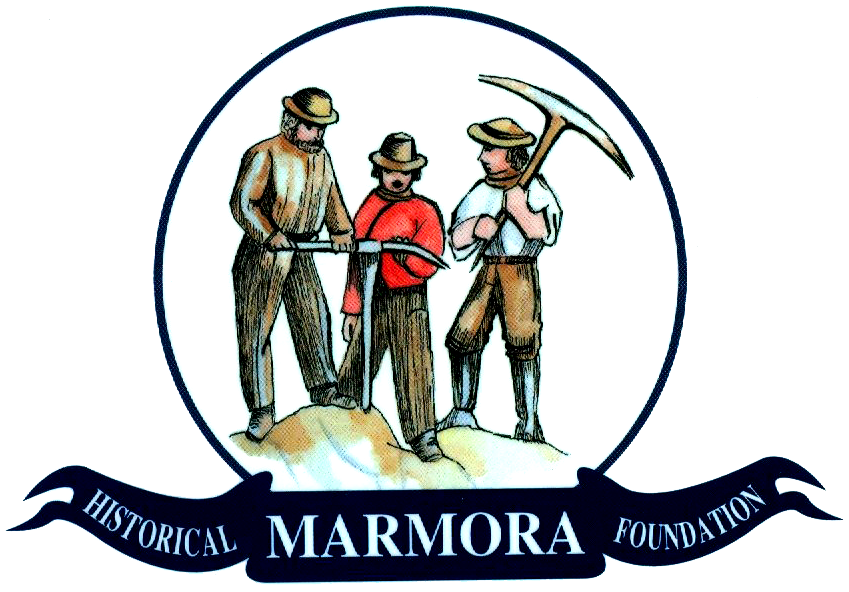Profile of Michael John O'Brien, Deloro Tycoon
Click here to read more on O'Brien's Business interests described by Ottawa Citizen, Aug. 14, 1926
Michael John O'Brien was born on September 19th, 1851 at Lochaber, N.S, the son of John O'Brien (1799-l869) and Mary E. Cleary. Described as a gangly high school dropout, he left school while he was in grade 8 to work as a water boy on a railway construction site. He became a very rich man. By 1916, his personal worth had soared to 1.6 million dollars. It was he who was built the company town, Deloro, that revolved around the plant, which at its peak would employ 2000 men. They built 2 schools, a hospital and a community hall. Clapboard houses sprung up beneath the maple trees that lined Deloro's two main streets, Deloro Avenue and O'Brien Street.
O'Brien married Jennie Barry in December 1883 at St. Francis Xavier Church in Renfrew, Ontario. Later remarried Grace Robertson in 1925. He was 74 years of age at the time and Grace was 40 years old. He was a railway builder, industrialist and philanthropist. He was named to the Senate of Canada in 1918. He was a founder of the town of Renfrew, Ontario.
He started in the railway business as a railway labourer during a period of great expansion of railways in Canada, eventually becoming a railway builder. He arrived in Renfrew in 1879, when he and two partners won the contract to build the Kingston and Pembroke Railway. He built the National Transcontinental Railway from the Maritimes to the Crow's Nest Pass, a distance of 1800 miles, and from Winnipeg to the Pacific Coast a distance of 1750 miles.
In 1891 he went bankrupt after a disastrous contract for the Canada Atlantic Railway. He slowly reasserted his presence, winning numerous railway-building and concrete-bridge contracts in Nova Scotia, a section of the Welland Canal, docks and slips at Ojibway, Ont, and grain terminals at Fort William and Port Arthur, Ont. From 1902 to 1905 he was commissioner of the fledgling Temiskaming and Northern Ontario Railway (nowOntario Northland). He opened the O'Brien silver mine in Cobalt, Ontario in 1903. His influence in Renfrew and the surrounding area was everywhere, including a dairy, woollens and knit factories, and saw and planing mills. O'Brien's philanthropic acts were equally numerous and diverse. Many of the heritage buildings, including the opera House in Renfrew can be traced to his patronage.
In 1906, he became the President of the Deloro Smelting and Reduction Company.
In June, 1909, Father Murtagh, pastor of the Sacred Heart Church in Marmora was a guest of Father Ryan and Michael J. O'Brien, by this time a millionaire and owner of the Deloro Plant. Father Murtagh intended to build a new separate school in Marmora and wanted an assurance from Mr. O'Brien that his taxes from the Deloro Smelting and Reduction Company would go towards the new school to be built in 1915.
In 1909 he became involved in ice hockeywhile living in Renfrew, financing several ice hockey teams run by his son Ambrose O'Brien He was determined that the Renfrew Creamery Kings (later known as theMillionaires) hockey team would challenge teams like Ottawa, Quebec and Montreal for the Stanley Cup. The Renfrew Creamery Kings sought to be allowed to play in the Eastern Canada Amateur Hockey Association, but with no success. O'Brieneventually financed and put together his own league, the NHA. The Creamery Kings played two seasons of hockey in the NHA, 1911 and 1912, until M. J. O'Brien pulled out to pursue his interests in the railroad
He financed teams in Cobalt, Haileybury, Montreal and Renfrew, which all played in the founding season of the National Hockey Association. He donated the O'Brien Cup to the league, which was used until 1950 by the National Hockey League and is in the collection of the Hockey Hall of Fame. The Cup was fabricated using silver from an O'Brien mine.
He recruited and outfitted railway battalions, sending 1018 men to the World War I effort. He acquired vast sections of timber rights, power rights, and farms in the east and large tracts of land in the west as well as properties in the United States and Mexico.
He served as Senator for Ontario from 1918 to 1925. He died in 1940 in Renfrew. His son died in 1968
Read more:
O’Brien: From Water Boy to One Million A Year | Burnstown Publishing House
J. Ambrose O'Brien
In 1909 when the Eastern Canada Association was the only professional hockey league and Renfrew's application for admission was rejected, J. Ambrose O'Brien almost single-handedly organized the rival National Hockey Association and was instrumental in founding the Montreal Canadiens to play in the new league.

